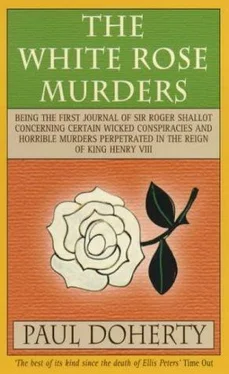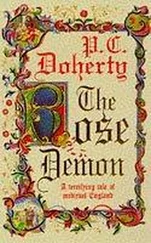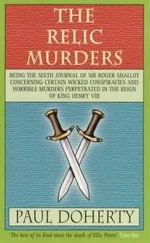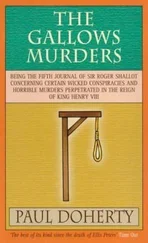Paul Doherty - The White Rose murders
Здесь есть возможность читать онлайн «Paul Doherty - The White Rose murders» весь текст электронной книги совершенно бесплатно (целиком полную версию без сокращений). В некоторых случаях можно слушать аудио, скачать через торрент в формате fb2 и присутствует краткое содержание. Жанр: Исторический детектив, на английском языке. Описание произведения, (предисловие) а так же отзывы посетителей доступны на портале библиотеки ЛибКат.
- Название:The White Rose murders
- Автор:
- Жанр:
- Год:неизвестен
- ISBN:нет данных
- Рейтинг книги:4 / 5. Голосов: 1
-
Избранное:Добавить в избранное
- Отзывы:
-
Ваша оценка:
- 80
- 1
- 2
- 3
- 4
- 5
The White Rose murders: краткое содержание, описание и аннотация
Предлагаем к чтению аннотацию, описание, краткое содержание или предисловие (зависит от того, что написал сам автор книги «The White Rose murders»). Если вы не нашли необходимую информацию о книге — напишите в комментариях, мы постараемся отыскать её.
The White Rose murders — читать онлайн бесплатно полную книгу (весь текст) целиком
Ниже представлен текст книги, разбитый по страницам. Система сохранения места последней прочитанной страницы, позволяет с удобством читать онлайн бесплатно книгу «The White Rose murders», без необходимости каждый раз заново искать на чём Вы остановились. Поставьте закладку, и сможете в любой момент перейти на страницу, на которой закончили чтение.
Интервал:
Закладка:
'Yes,' I interrupted, 'when my master told you about Selkirk's mutterings, you seemed alarmed, even disturbed.'
Ruthven gazed gloomily at me. Do you know, I really thought he was going to tell me something, but his protuberant eyes refused to meet mine.
'I have said enough,' he muttered as he saw Moodie approach.
'The Queen mourns for her husband,' the chaplain squeaked.
'Does she?' Ruthven quipped. 'How can she?' 'What do you mean?' Benjamin turned as quick as a top, his eyes sharp and questioning. 'What do you mean, Ruthven?'
'I have heard stories, Master Daunbey.' Ruthven nodded towards the church. 'They say King James was not killed at Flodden and that corpse belongs to someone who merely looks like him.'
'Is that possible?' I asked.
Ruthven pursed his lips.
'It's possible,' he whispered. 'First, we always see what we expect to see. Secondly, the royal corpse was mangled; it had been in the hands of embalmers and above ground for four years. Thirdly, at Flodden James dressed at least sixteen of his knights in royal armour and coat of arms. God knows for what reason – he didn't lack courage. And, finally, there were several knights of James's court who looked like him.' He glanced up and saw Agrippa approaching. 'That is all,' he concluded.
I watched him walk away. Benjamin, his arms folded, seemed lost in his own thoughts. He waited until the smiling doctor had passed by.
'An interesting story, Roger. Do you believe it?'
'According to Fabyan's Chronicle,' I replied, airing my knowledge, 'when Henry IV fought at Shrewsbury against Hotspur, he dressed several of his knights in royal armour.'
[Oh, by the way, I also told William Shakespeare that and other details. You will read them in his play Henry IV. Will was so grateful he said he would base one of the characters of that drama on me. I think it is the Prince, though malicious tongues say it is Falstaff. God knows, I have nothing in common with him!]
We could talk no longer. Catesby was rapping out orders for us to mount and within the hour we had left St Mary Grace's, striking east for Canterbury. Queen Margaret and Lady Carey rode in front of the cavalcade, shimmering in their heavy brocade dresses. Alongside them rode Carey, Agrippa and Catesby, then us followed by the creaking carts and household minions. Melford and a group of archers fanned out before the cavalcade; they cleared the way of the usual merchants, traders, pedlars, students and hosts of vagabonds and beggars who cluster on every road like flies round a horse's arse.
At Canterbury Queen Margaret said prayers before the tomb of Thomas a Becket. Lord, such a sight: the casket which held Becket's body was encased in sheets of solid gold and, over the years, devout pilgrims had brought sapphires, diamonds, pearls and small rubies to be fastened into the goldwork as homage to the saint. Some of these gems were as large as goose eggs but the most precious was an exquisite diamond called the Regal of France. It had such fire and brilliance that even when the church was dark this diamond glowed like a flame in the sanctuary.
[Old Henry put an end to all that. The tomb was wrecked, the gold and silver went to his mint, and the Regal of France on to his large fat hand. Why do I tell you this? Well, the Regal of France caused murder, bloody intrigue and violent death. But that was for the future – you can read about it in one of my journals.]
After Canterbury we took the old Roman Road into Hertfordshire, planning to stop at a royal manor, but the weather turned cold; blustery rain clouds sped in from the sea and we were forced to break our journey at one of the great taverns just outside Canterbury. Melford soon cleared the chambers, telling the irate landlord to shut his mouth and present to the Exchequer, before the Feast of St John the Baptist, whatever bills we incurred. I remember that night well as the evil we had to face gathered and drew closer.
We were all sitting in the great taproom. It was dark and blustery outside and the flames of the candles danced, filling the room with moving shadows. The meal was over, Queen Margaret and Lady Carey had withdrawn and we men sat around the large oaken table, drinking deeply from the wine bowl. Ruthven had his cat with him, stroking it and muttering something – I could not tell whether he was talking to himself or his pet.
I noticed his comrades distanced themselves from him. Indeed, rumours about Ruthven were rife – how he was a warlock because he was left-handed and talked to his cat. Ruthven just ignored them.
[In those days, if you were a witch you were safe as long as you kept away from the common people: once I saw a group of villagers spread-eagle a warlock, drive a stake through his heart and bury him beneath a crossroads gibbet.]
Anyway, back to my companions in that darkened taproom: Catesby looked bright-eyed and flushed. Moodie, more like a mouse than ever, nibbled at a bit of cheese. There was ever-smiling Doctor Agrippa, hawk-visaged Carey, the thick coarsened face of Melford and, of course, Scawsby, his face sour as ever as if he had just broken wind and hoped no one would notice. The conversation swirled, passing from one topic to another.
Now Benjamin and I, recalling the Cardinal's secret instructions, had decided to reveal Selkirk's verses as soon as the opportunity presented itself. Benjamin indicated with meaningful glances at me that this stark, sombre evening was such an appropriate time. He skilfully guided the conversation back to the sinister events surrounding Selkirk's death for the murder had affected everybody. Oh, there had been speculation that Scawsby was wrong and the Scotsman had died because of some strange seizure. Or again, that his death was the result of the Black Arts, and many sombre looks were directed at Doctor Agrippa, Ruthven and even Benjamin. My master bore all this with his usual tolerance and bonhomie. He had apparently recovered from his visit to Johanna, hiding his feelings behind the usual veil of secrecy. Indeed, he had hardly referred to her except once as we passed through a small hamlet and had seen children baiting a poor, crazed woman by the crossroads. Benjamin glanced sideways at me and grimaced despairingly. However, he had not forgotten Selkirk's death and, when we were alone, constantly speculated on how the Scotsman had been murdered and what his enigmatic rhyme could mean.
In that taproom he decided to push the matter further and Catesby gave him his chance.
'If Selkirk was murdered,' Sir Robert declared, 'what was the reason?'
'Master Daunbey should have found that out,' Scawsby replied spitefully.
'He questioned the wretch long enough,' Carey barked.
Moodie squeaked in support whilst Ruthven just dismissed them all with one scathing look.
'Oh, but I did,' Benjamin announced.
'You did what?' Carey snapped.
'I may not know how Selkirk died but I think I know why.'
'Nonsense!' Carey retorted. 'What do you mean?'
'Selkirk wrote a poem,' Benjamin continued quietly.
'Mere brainless chatter!' Carey answered.
'Oh, no,' Benjamin whispered.
Outside the wind blustered and beat against the wooden shutters and the huge sign, swinging on its iron pole, creaked and groaned as if calling out across the darkened, rain-soaked meadows.
Benjamin closed his eyes and chanted aloud:
'Three less than twelve should it be,
Or the King, no prince engendered he.
The lamb did rest,
In the falcon's nest.
The Lion cried,
Even though it died.
The truth Now Stands,
In the Sacred Hands,
Of the place which owns
Dionysius' bones.'
Now, the Lord be my witness, Benjamin's words created a pool of watchful silence.
Ruthven pushed his hair wildly back from his face. 'Repeat it, man!' he whispered hoarsely.
Читать дальшеИнтервал:
Закладка:
Похожие книги на «The White Rose murders»
Представляем Вашему вниманию похожие книги на «The White Rose murders» списком для выбора. Мы отобрали схожую по названию и смыслу литературу в надежде предоставить читателям больше вариантов отыскать новые, интересные, ещё непрочитанные произведения.
Обсуждение, отзывы о книге «The White Rose murders» и просто собственные мнения читателей. Оставьте ваши комментарии, напишите, что Вы думаете о произведении, его смысле или главных героях. Укажите что конкретно понравилось, а что нет, и почему Вы так считаете.












